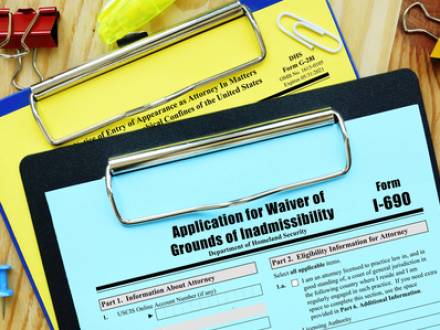Proving Extreme Hardship for a Waiver of Inadmissibility
 Non-U.S. citizens who want to live in the United States must follow certain legal steps. Completing these steps, however, does not guarantee a visa. Applicants who fall into certain categories may be denied on grounds of inadmissibility.
Non-U.S. citizens who want to live in the United States must follow certain legal steps. Completing these steps, however, does not guarantee a visa. Applicants who fall into certain categories may be denied on grounds of inadmissibility.
To find out if you or a loved one might be considered inadmissible, speak with a Texas immigration attorney. An experienced lawyer can review your specific circumstances, advise you on how immigration authorities might view your application, and advise you on whether you qualify to apply for a waiver of inadmissibility.
This article will discuss inadmissibility, waivers of admissibility, and how to prove extreme hardship to obtain such a waiver.
What Is Inadmissibility?
The U.S. Immigration and Nationality Act sets out certain criteria that may make a visa applicant inadmissible, meaning he or she is not accepted in the U.S. Immigration authorities may consider a noncitizen inadmissible if he or she:
- Has committed certain crimes
- Poses a national security threat
- Suffers from certain health issues
- Is likely to be a public charge, which means being a strain on government resources
- Has misrepresented himself or herself
- Is in the United States illegally
- Fits miscellaneous criteria
These factors and others may cause an alien to be denied residence in the U.S. However, some noncitizens are eligible to apply for a waiver of inadmissibility.
What Is a Waiver of Inadmissibility?
Someone who is deemed inadmissible by the U.S. Citizenship and Immigration Services (USCIS) may appeal the decision by completing and submitting form I-601 or I-601A. If the appeal is successful, the USCIS will grant a waiver of inadmissibility, which means the applicant is eligible for admission.
Obtaining a waiver of inadmissibility is not a simple task, however. One of the key things to show when applying for a waiver is that a relative who is a U.S. citizen will suffer "extreme hardship" if the applicant is denied. This can be either because:
- The U.S. relative will experience hardship if the applicant does not enter the United States; or
- The U.S. relative will experience hardship if he or she is forced to join the applicant in his or her own country.
What Qualifies as Extreme Hardship for a Waiver of Inadmissibility?
Extreme hardship is more than just the pain of being separated from a relative. It refers to being subjected to very difficult circumstances. For example:
- The U.S. relative will lack necessary medical care if the applicant is denied entry.
- The U.S. relative requires financial support that the applicant can only provide if he or she is in the country.
- The U.S. relative is suffering mental anguish, such as clinical depression, from the inadmissibility.
Contact a Plano, TX Waiver of Inadmissibility Lawyer
There is no formula that guarantees whether the USCIS will grant a waiver of inadmissibility, which is why it is best to apply through a Dallas, TX immigration attorney. Using our extensive knowledge and experience, we will provide you with one-on-one legal guidance to increase your chances of the best possible outcome. Schedule a free consultation at the Law Office of Jae Lee by calling 214-295-3014 today.






